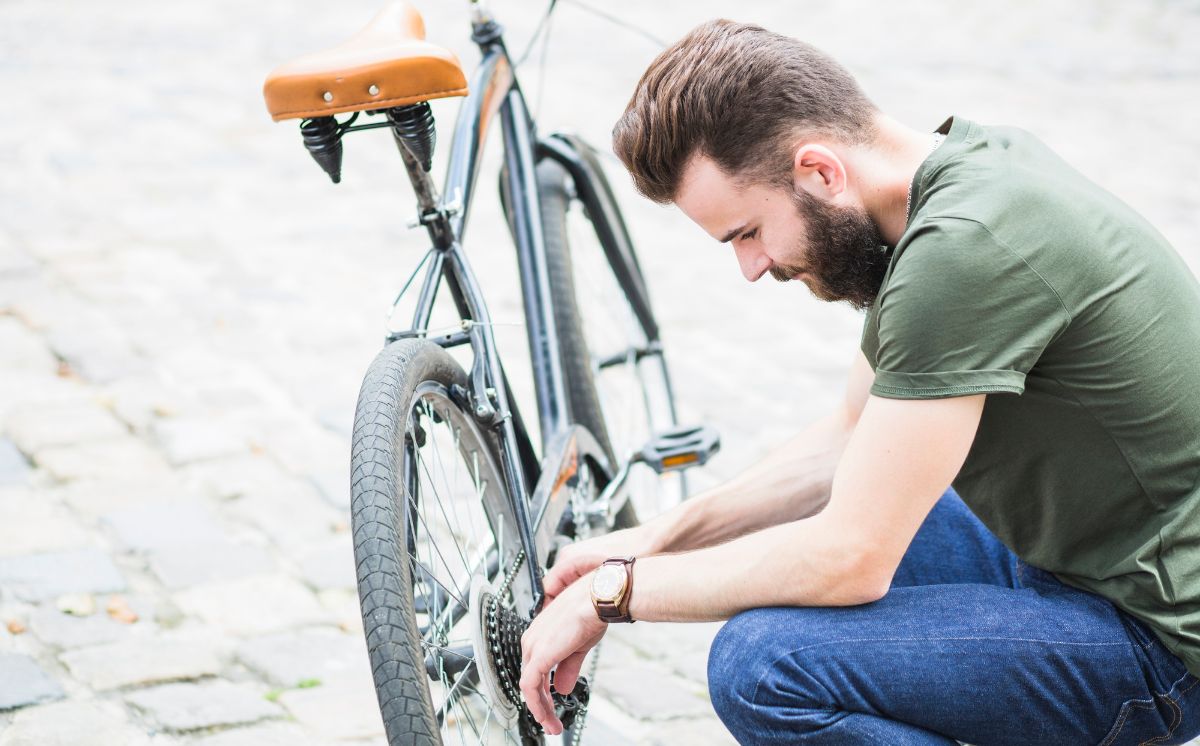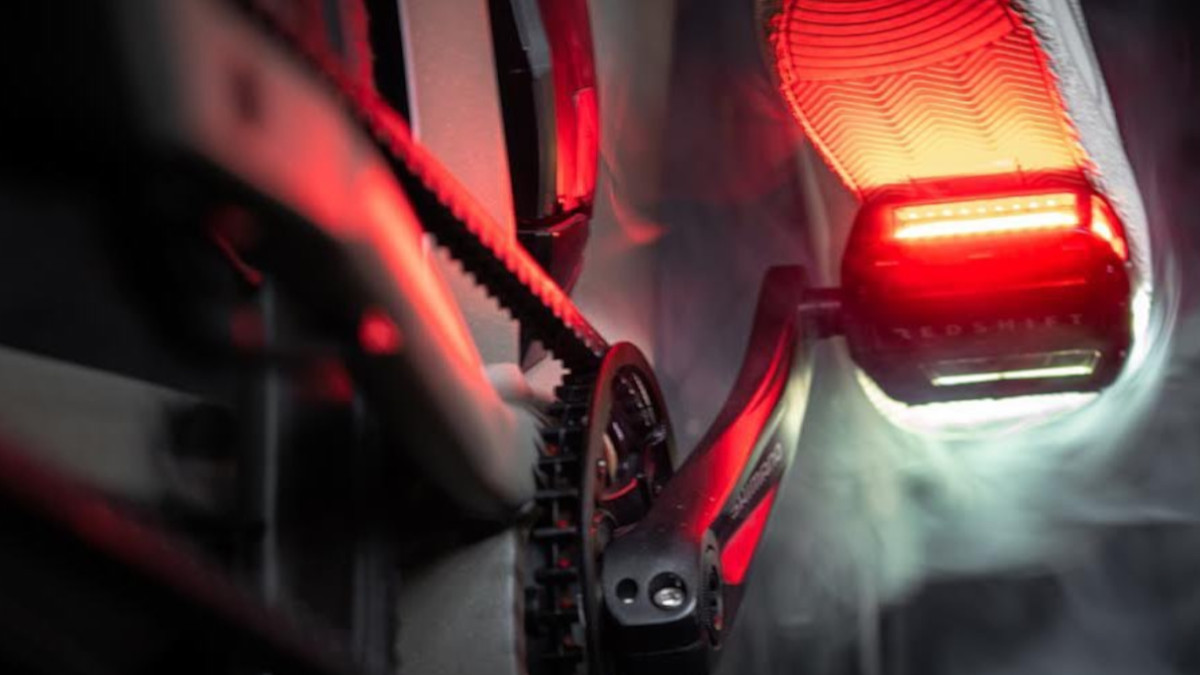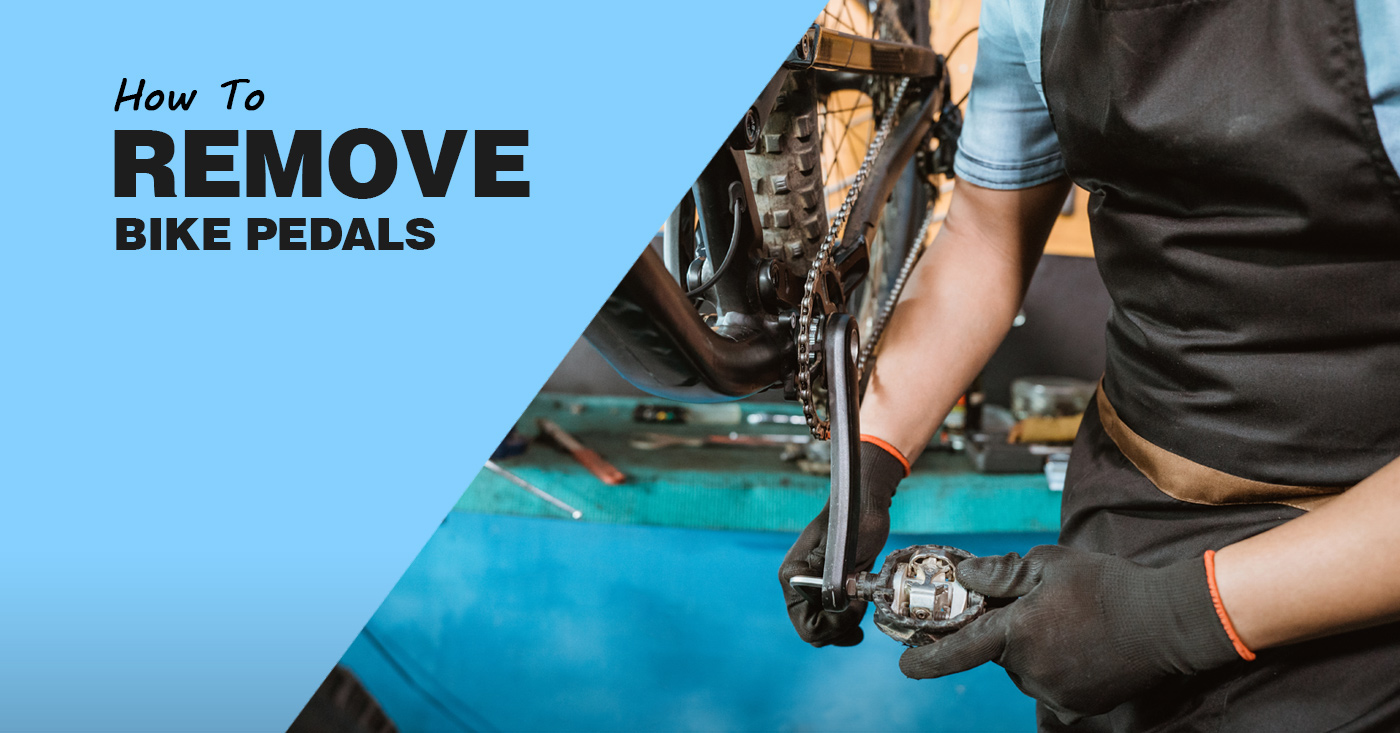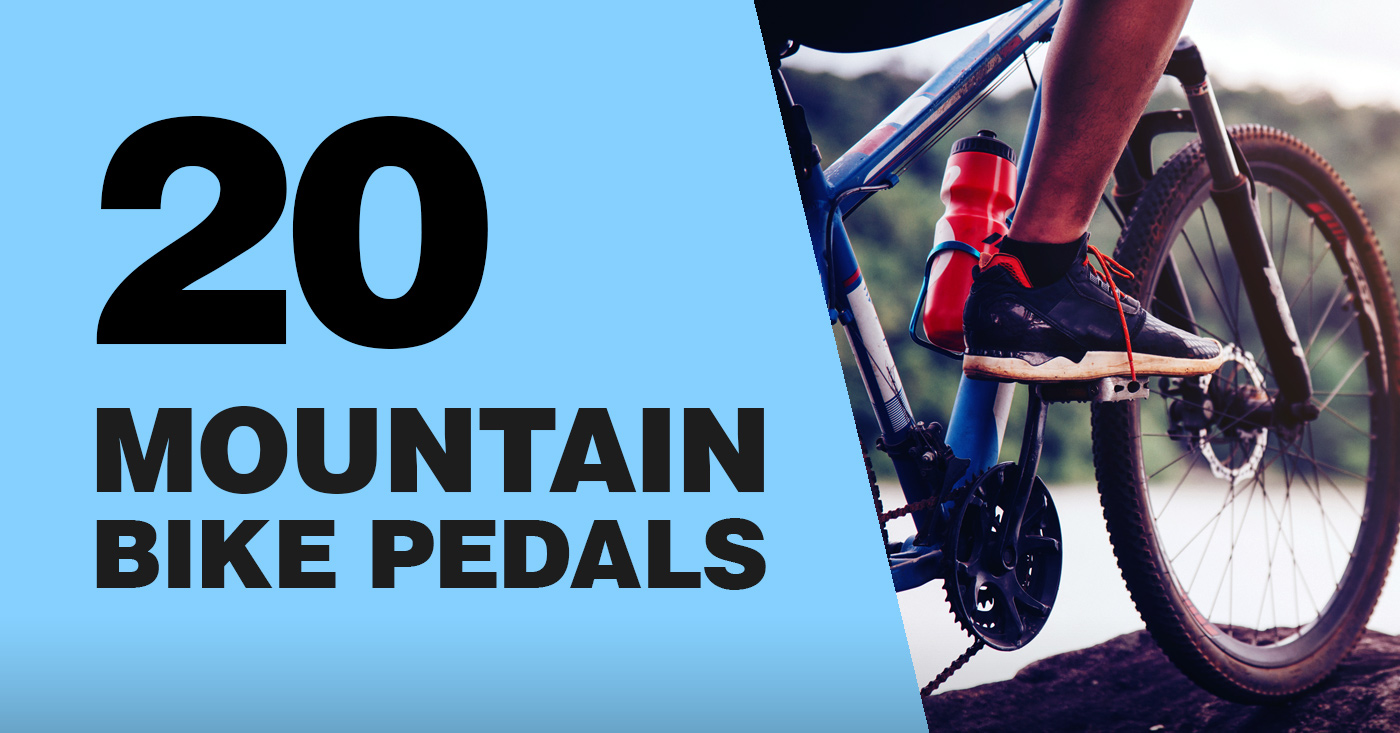Do you feel like your bike pedals are stiff? Or have you heard any squeaking from the pedals? Yes? Then guess what? Your pedals are in need of some serious greasing! Greasing the pedals is a basic maintenance task but it keeps your bike running smoothly for a while! It also prolongs the life of your pedals so it’s a win-win situation.
Greasing the pedals takes your bike a long way. There is less wear and tear. Especially if you ride in wet conditions frequently. And it is not that tough of a job! Anybody can do it! To grease your pedals, simply remove the pedals from the crank arms and apply a thin layer of grease to the threads. Then, screw the pedals back onto the crank arms and tighten them securely. So, what are you waiting for? Grab a grease tin and get scrubbing today!
Don’t let winter stop you from biking! Learn how to winterize your freehubs today.
Why Do Bicycle Pedals Need To Be Greased?
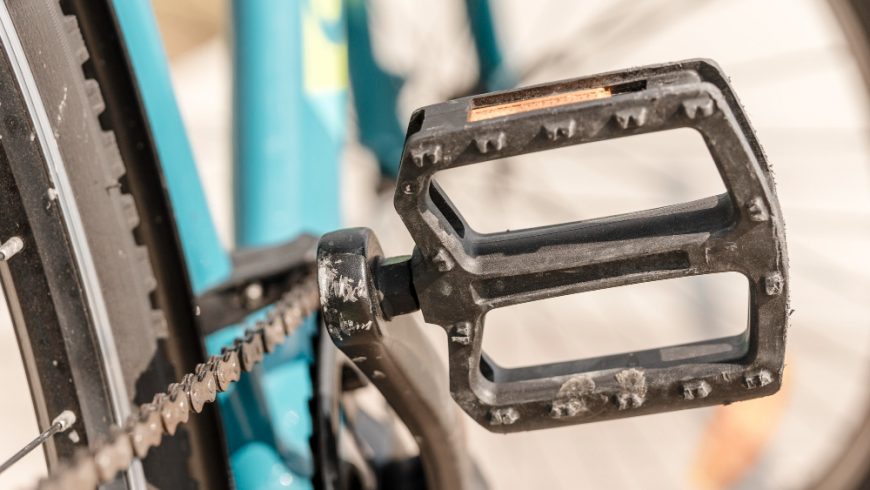
Greasing Bicycle Pedals is a part of bicycle maintenance. And there are some reasons that make it an important one!
1. There Will Be Less Friction
Greasing the pedal threads and bearings reduces friction between moving parts. This reduction in friction allows for smoother and more efficient pedaling. Cyclists often seek to minimize any unnecessary resistance to maximize their power output and speed.
2. It Will Make Your Bike More Durable
Everyone wants their bike to excel in performance, in order for that to happen we must also be willing to maintain it every now and then. Grease provides a protective barrier against moisture and contaminants. In wet or muddy conditions, greased pedals are less likely to suffer from corrosion or wear and tear, which can lead to pedal failure or reduced performance over time.
3. You Will Enjoy Quieter Pedaling
No one wants any kind of annoying sound while they are riding their bikes, and in order to do that, you must grease the bike pedals. Properly greased pedals can significantly reduce creaking and squeaking sounds that may occur when pedals are dry or improperly lubricated. This is particularly important for competitive cyclists who need to maintain concentration and focus during races. Grease your bicycle pedals today and enjoy virtually silent rides!
Are you in need of a bike tune-up? Check out our guide to learn how!
4. There Will Be An Improved Power Transfer
Power Transfer must be seamless when we are riding our bikes, and a greased bicycle pedal will make sure of that. Greased pedals ensure that energy transferred from your legs to the bike is not wasted due to excess friction. This results in a more efficient power transfer, which is vital for achieving top speeds and maintaining high performance over long rides.
5. A Smoother Pedal Rotation
Greasing the pedal bearings allows for a smoother pedal rotation. This means less resistance when you’re pushing down on the pedals and when you’re pulling up, making it easier to maintain a consistent cadence and pedal stroke, especially during high-intensity efforts or climbing.
6. It Will Make Maintainance Easier
Cyclists want easy and smooth maintenance of their bicycles, this can be done if the bikes are already in great condition. Properly greased pedals are easier to maintain and disassemble when necessary. For skilled cyclists who often perform their bike maintenance, this means less hassle when cleaning, servicing, or replacing pedal components.
Don’t wait until it’s too late! Learn how to maintain your bike with our easy-to-follow guide.
7. You Will Get A Consistent Performance
You get to experience an amazing performance one day, and the other day you get to experience something really horrid. Nobody wants that. Greased pedals provide a consistent and predictable feel when riding. Skilled cyclists rely on consistent performance to make split-second decisions, control their bikes precisely, and optimize their overall riding experience.
8. There Will Be A Reduced Risk Of Injuries
A well-maintained bike with greased pedals is less likely to have unexpected mechanical issues that could lead to accidents or injuries. Skilled cyclists understand the importance of minimizing risks to ensure their safety while riding at high speeds or in challenging terrain.
Get running in no time with our easy-to-follow bike assembly guide.
Are There Any Risks Involved With Bicycle Pedal Greasing?
There are many benefits of greasing your bicycle but there is always a risk of over-greasing. Excessive grease welcomes unwanted dust and debris. Over time, this dust and debris leads to corrosion and instead of having less friction, you will be facing more of it.
Pedal threads keep the pedals in place on the cranks. If you are not properly greasing these threads can become seriously tightened. Your pedal gets stuck.
Stuck pedals? No problem! Follow our guide to remove your bike pedals with ease.
But if you over-grease them, it will be more difficult to remove the pedals. Not to mention that greasing is a messy affair! You can get your hands, clothes, the floor, and a lot of other things dirty while doing so!
Read our guide to find out other reasons why your bike is hard to pedal.
Is It Possible To Put On Bike Pedals Without Grease?
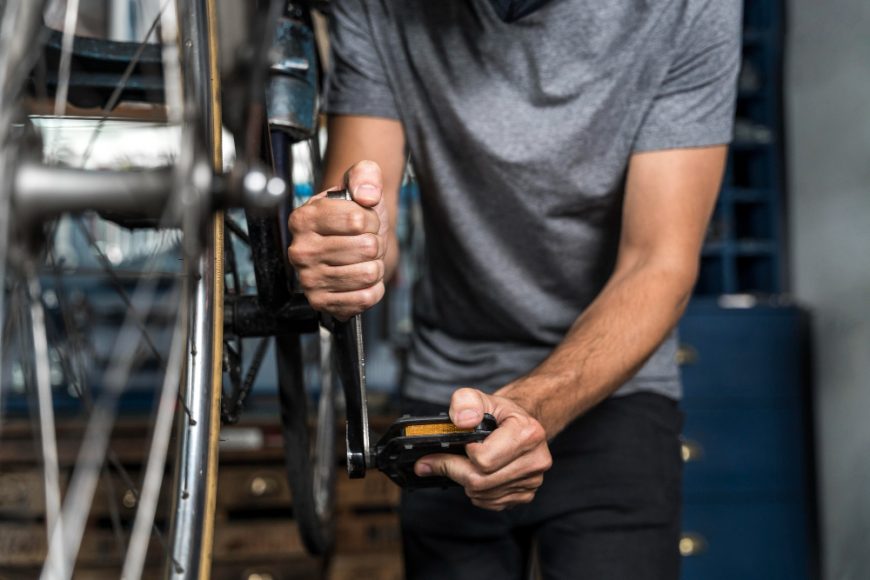
Yes, you can put bike pedals without applying grease. But wait, there’s more to it. I wouldn’t recommend putting bike pedals on without grease. Greasing the pedals before you put them on the bike will help them rotate more efficiently. It will also save you some time since you won’t have to take them off to grease them for a while.
Grease will also act as a protective layer for your pedals. It will be easier for you to remove the pedals when you need to. When you are fitting the pedals onto the crank, I suggest that you grease the thread before you screw it on. This will make it easier for you to remove them when you need to and it also makes sure that the pedal threads don’t fall off.
Best Bicycle Pedal Greases
| Grease Name | Price ($) | User Review |
|---|---|---|
| Park Tool PolyLube 1000 | 10.36 | This is the best grease I’ve ever used for my bicycle pedals. It’s smooth, water-resistant, and long-lasting. I highly recommend it to any cyclist |
| Finish Line Premium Grease | 21.99 | I’ve been using Finish Line Premium Grease for a few months now and I’m very impressed. It’s kept my pedals running smoothly and quietly, even in wet and dusty conditions |
| Dumonde Tech Pro-X Freehub Grease | 19.00 | I’ve been using Dumonde Tech Pro-X Freehub Grease for a few years now and I’m very happy with it. It’s kept my pedals running smoothly and quietly, even in extreme conditions |
| White Lightning Crystal Grease | 22.08 | I’ve been using White Lightning Crystal Grease for a few months now and I’m very impressed. It’s kept my pedals running smoothly and quietly, even in wet and dusty conditions. |
| Pedros Synthetic Grease | 10.79 | Pedros Synthetic Grease is a great product. It’s smooth, water-resistant, and long-lasting. I highly recommend it to any cyclist who wants to keep their pedals running smoothly |
What Are The Alternatives To Bicycle Pedal Grease?
What happens when you run out of bike grease, what should you do then? Well, I am glad that you asked! Here are some alternatives that you can use.
| Alternative | Advantages | Disadvantages |
|---|---|---|
| Chain Lube | Readily available, may reduce friction | May not provide sufficient protection against moisture and contaminants. Requires more frequent reapplication. |
| Motor Oil | Provides decent lubrication | Not specifically designed for bicycle applications, may not adhere well to pedal components. Can be messy. |
| Bearing Grease | Offers excellent protection and durability | Thicker consistency may create more friction. Can be overkill for pedals and harder to apply. |
| Teflon-Based Lubricant | Low friction, water-resistant | May not provide long-lasting lubrication for pedal threads and bearings. |
| White Lithium Grease | Good for general lubrication | May attract dirt and debris, potentially leading to increased wear and tear. |
| Silicone-Based Lubricant | Water-resistant, non-corrosive | May not provide long-lasting lubrication for pedal components. |
| Bicycle-Specific Grease | Designed for pedal and bike applications, good protection | Generally more expensive than other alternatives. |
Is It Worth Using Anti-Seize On Bike Pedals?
Anti-seize is a lubricant and corrosion inhibitor that helps prevent the threads of fasteners (like bolts and screws) from seizing or sticking due to corrosion, heat, or other factors. It also makes it easier to disassemble components in the future.
Can We Use Anti-Seize On Bike Pedals Instead Of Grease?
Yes, you can use anti-seize on bike pedals but I don’t recommend it. The reason behind me saying no is because it doesn’t work as grease. The primary purpose of anti-seize is to eliminate corrosion. It should only be applied where two different types of metal connect. Cyclists don’t use anti-seize on anything that moves or spins as applying it can be very damaging. I always prefer grease because it serves both as a lubricant and anti-seize.
Since Anti-Seize is formulated with high-solids content, it causes the parts to jam. If we compare it directly with grease, then we can see different results. Grease is known for reducing friction between two surfaces, which is what cyclists need in this situation.
What Does The Cycling Community Say About Greasing Bike Pedals?
Don’t just take my word for it. Hear about what the cycling community has to say about greasing the bike pedals.
Always use grease on pedals and axles when re-installing
Lithium grease does the job. Super cheap, comes in spraycans, kind of thick.
Full explanation for newbies – when fitting pedals to your cranks, apply grease to the threads before screwing them in – they won’t fall off but will be easier to remove when the time comes.
Which Famous Cyclists Actively Grease Their Bike Pedals?
Have you ever wondered if it is you or even your cycling heroes who grease their bike pedals? Let’s find out, shall we?
- Chris Froome: Four-time Tour de France winner Chris Froome is a big fan of greasing his pedals. In an interview with Cycling Weekly, he said: “I grease my pedals regularly, especially before big races. It helps to keep them running smoothly and prevents creaking.”
- Geraint Thomas: Another four-time Tour de France winner, Geraint Thomas, also recommends greasing pedals. He told Bicycling magazine: “I grease my pedals every few months, or more often if I’m riding in wet or muddy conditions. It helps to keep them from seizing up and makes them easier to pedal.”
- Peter Sagan: Three-time world road race champion Peter Sagan is another cyclist who believes in greasing pedals. He told CyclingTips: “I grease my pedals every week, or more often if I’m riding in wet or muddy conditions. It helps to keep them running smoothly and prevents wear and tear.”
Watch: How To Grease A Bike Pedal
FAQs
What Kind Of Grease Do You Use On Bike?
You can use marine-grade grease for lubricating your bicycle. An all-purpose bike grease is also suitable to be used on a bike.
Is Lithium Grease Ok For Bike Pedals?
Yes, you can use lithium grease for bike pedals.
How Often Should You Grease Your Bike Pedals?
The threads of your bike pedals are extremely vulnerable to dirt, sand, and dust. It is my advice to apply grease on pedals a few times a year.
Which Famous Cyclists Actively Grease Their Bike Pedals?
Chris Froome, Geraint Thomas, and Peter Sagan are a few of the famous cyclists who actively grease their bike pedals.
Recap
Greasing the pedals is an important part of bicycle maintenance. Greasing pedals can provide several benefits, such as reducing friction, preventing corrosion, and making them easier to remove when needed. However, it’s important to use the right type and amount of grease. Check your pedals when necessary to make sure they are functioning optimally.
Nonetheless, you should decide if your bicycle pedals need to be greased based on your individual needs. Asses of your riding circumstances and maintenance need to make a sound decision. So what is it going to be? Are you going to join the pedal greasing party or is it a miss? Let me know in the comment section below!
Also Read:
- How To Remove Bike Pedals
- 20 Best Mountain Bike Pedals
- Your Guide To Winter Bike Maintenance
- How To Choose The Right Bike Work Stand For Your Bike Repair Needs
Should you have any questions or require further clarification on the topic, please feel free to connect with our expert author Rhodes Perry by leaving a comment below. We value your engagement and are here to assist you.


